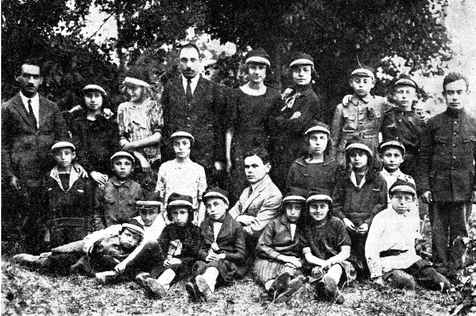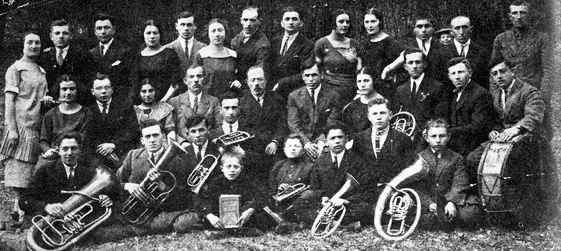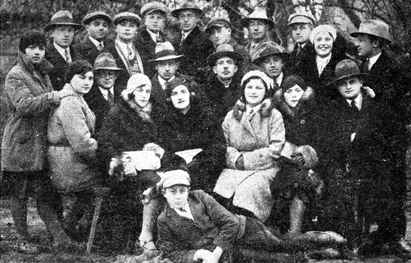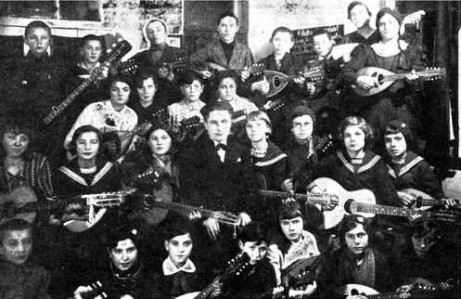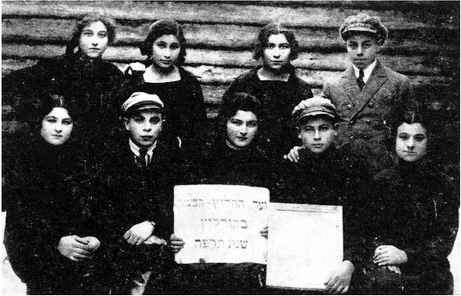[Page 165]
There, Where I was Born – Grows A Tree
Leah Kornfeld -Lubchanski - Herzliya
Translated from the Yiddish by Harvey Spitzer z”l
Not far from the open road to the small town of Mir, several tens of meters from Perevelutzki's house, stand three trees, two of which reach up to the sky, with many branches and fresh, green leaves aglow from the golden rays of the sun. Many such trees grow there in that section. There were times when I even bore a hatred to them.
The first in a row of standing, hunchbacked trees is mine. It belongs to my feelings. I took care of it with my own hands.
I remember one day when we assembled in the large hall of the Povshechne synagogue, each class in its place standing in rows. The school principal, Mr. Zolmbe, comes out of the office and says, "Children, tomorrow you have a day off from school. Tomorrow we're going to plant trees on the border of the streets in Korelitz. Those of you who want to take part in planting trees should come tomorrow afternoon with planting tools. And so we set out, loaded down with spades and axes via Ogrodnik to the Pritzonevitch small woods. And on the way, I was chatting with Nechama Meyerovitch, and when we got to the little woods, we saw the last of our group vanish, just as if the woods had swallowed them up. We were afraid to go any deeper into the woods and went back. We returned over the road which connected Ogrodnik with Korelitz, passing by Yisrael Slotzki's mill and through the miller's inclined street. The frolicking sounds of children playing have remained in my memory to this very day as they slid down the hill on their little sleds on frosty, wintery evenings.
But this time, going through Vilner Street, there was no joy in my heart. Due to my own carelessness, I missed the opportunity to decorate the naked streets of Korelitz with trees. There was no reason to be sorry, however, because the pupils from the lower grades went out to plant trees the next day, and my friend Chayke Dushkin and I joined them in planting trees.
The sapling we planted didn't live very long. A cruel hand tore it out of the ground. We planted another sapling, carefully tying the branches around with little ropes and securing it to the ground with stones. We carried water for it from the river more than once to quench its thirst so that it would not dry out. We hoped that when the tree grew and put on fresh, green leaves, we would come and sit under the tree to protect ourselves from the burning sun.
Once, when we passed by, we noticed our little tree standing bare. There were no more ropes by which it was tied to the ground. But, as if on spite, it grew high, with great audacity, to heaven. Is our tree still standing there? Don't say it's not there.
|
|
Teachers and Pupils in the Hebrew School, 1929
Sitting from right - first row: Chaim Bolotnitzki, Malka Rabinovitch, ……., Elka Mordchovitch, Shifra Rakovitzki, Gutel Mordchovitch, Yitzchak-Berl Gantzbitch;
Second row: Moshe Koznitch, Yarka Yelin, Elka Koznitch, Solomon ( teacher), Raisel Niselbitch, Berl Lubchanski, ……
Third row: Yosef Portnoi (teacher), Grisha, Yaakov Avramovitch, Rivka Yelin, Menucha Avramovitch, Shlomo Davidovski (teacher), Yehudit Karlitzki (Golkovitch), Chaya Nignivitzki, Goldberg (teacher) |
[Page 167]
The Bank and Benevolent Fund in Korelitz
Fruma Gulkovitch-Berger, New York
Translated from the Yiddish by Harvey Spitzer z”l
Despite the many years that have gone by since the Holocaust, time has not erased our love for the way of life that once characterized our small town. We were all one big family.
Korelitz Jews were not especially wealthy, but they had a good reputation as people who were always concerned about one another. They empathized with someone's sorrow or trouble, and they rejoiced together on happy occasions. The quality of helping someone in need was always developed among the Jews in Korelitz.
In order to ease the difficult material situation of the needy, a people's bank and benevolent fund were created in the small town. Both of these charity institutions were very important for many Jews of Korelitz. The bank was created from subsidies received from the “Yakopa” organization, whose main committee was in Vilna. Thanks to the energetic efforts of certain activists who were concerned about the welfare of the needy, the doors of the bank were always open for those in need of loans.
Here we should mention the manager and bookkeeper of the bank, Yitzchak- Meyer Klatzkis, a former Jewish teacher, an intelligent, conscientious person who performed his work with love and devotion. The management of the bank was responsible for supervising the bank's work which involved many technical things. For the most part, the bank's administration was made up of three or four officers. I don't remember exactly who they were, but I think the following people belonged to the directorate: G. Namiot (druggist), Gezl Relien (merchant) and T. Kletzitzki (merchant).
Whoever needed a bank loan had to have two guarantors considered trustworthy. The guarantors naturally had to sign. Interest was charged for the borrowed money, but if the borrower was, God forbid, unable to pay back the loan, the co-signers were responsible for covering the debt.
The bank's conditions were often too strict for many poor people, and so a benevolent fund was set up in the town. The fund actually belonged to the handworkers' union. One could take out a short-term, interest free loan, and craftsmen and those belonging to the poorer layer of the population especially enjoyed the benefits of the charity fund.
The benevolent fund was created thanks to money sent from America and from money raised in the town itself for that purpose through various funds and enterprises. Our dramatics club, for example, put on plays, and the proceeds were entirely reserved for the benevolent fund.
The following persons belonged to the management of the fund: Berl Busel, Yaakov Gershinovski, Yisrael Rudel, Efroimski and Berl Falushski. The above-mentioned people accomplished very much and were very active in the area of creating money funds for the benevolent fund charity and managed its operation.
The directorate would often change, of course, and therefore, anyone who was interested and capable of working in the fund would be able to do so. Both institutions - the people's bank and the charity fund - were very important for the Jewish population of Korelitz, both for the businessman and craftsman who often needed loans. The Korelitz Jews knew that there was a place to turn in time of trouble.
This is now all destroyed. No more Jews on the streets of the town - no more Jewish institutions.
[Page 168]
The Dramatics Club
Fruma Gulkovitch-Berger, New York
Translated from the Yiddish by Harvey Spitzer z”l
With these lines, I will eternalize the amateur theatrical performers from Korelitz and, at the same time, show the creative powers and the contributions of the Korelitz dramatics club for the development of Jewish culture in our small town.
Our small town was on a high cultural level. We had talented and intelligent young people who strove to create something. There were youth organizations bustling with activity in their meeting places. One of the most important and respectable youth groups was the dramatics club, which brought together amateur theatrical performers of the Yiddish stage.
I was the youngest of the third generation of performers in that ensemble. We used to put on Yiddish plays, which brought joy and festivity to young and old alike in our small town. This was the only entertainment of its kind because a troupe of professional actors seldom came to us. There were no movies either. The intake of our ensemble was used for important aims.
Our dramatics club would perform plays and dramas by classical Yiddish playwrights and dramatists.
Many very talented performers who could be compared to professional actors grew up in our dramatics club. Among these were the following:
Berl Falushski, who starred in “Koldunia” in the role of the witch. Although I was still too young at the time, the picture of the witch as performed by Berl still moves before my eyes today. And together with him, the whole ensemble held the audience spellbound.
Shefe Klatchka, a precious personality in the art of theatre. He was the director and, at the same time, played some of the most difficult roles. He influenced and held the whole ensemble together. We all listened to his remarks and directions with the utmost respect.
Chaim Bosel, a teacher at the Jewish school who would also find time to act in the Yiddish theatre. Many of us remember him in the role of “Batiushka Prokop” in the play “Chasia the Orphan”.
Berl Avrinski - one of the rare artists on the stage. I can still see him in the role of “Nevalah”. With what passion he played in “Yosha Kalb”! - an unforgettable talent.
The Gershinovski brothers, from the oldest to the youngest, all performed in the theatre - Yankel, Moishel, Yashe and Rutshke. My friend Yashe always acted well and was well suited to his role. Yankel and Moishel especially excelled in various roles. I performed with Moishel in “Jewish King Lear”, playing the part of his daughter, Teibele. I also performed together with Rutshke in “Groisen Gevins”. These were talents in whom one could take pride.
The Lifschitz brothers Berl and Dovid played various instruments, sang and danced. They were capable of doing everything.
The Women in the Ensemble:
The “comédienne”, Rivke Yelin - we called her Esther-Rachel Kaminski - was blessed with a great talent for acting. As soon as she appeared on the stage, she captivated the audience. She brought a lot of joy and laughter to the spectators, who thanked her with long, sustained applause.
Our dramatics club possessed very beautiful women including Menucha Avramovitch (she lives in Israel), Shefia Levit, Chaya-Leahke Shereshevski and others. If we needed someone for a smaller part, there was no problem. One became an artist overnight.
The leading roles - prima donna - were, for the most part, played by Menucha Avramovitch. Mania Kaganovitch (also living in Israel) was also one of the most important actresses.
Several of the former members of the Korelitz Dramatics Club live in America. Two of them are Chayke Dushkin and Bentshe Gulkovitch, my brother. I remember that when I would come to rehearsals, they would also talk about Sheindel, Peshe and Roza as “big stars”. Unfortunately, I didn't know them personally. They emigrated abroad, but no one in the town wanted to forget them. (Sheindel Koznietz lives in Israel).
We would prepare a presentation for every holiday, and every show would turn into a great cultural event in our small town. The dramatics club would also go out into the “provinces” to perform in the surrounding small towns and would also bring the local Jews much joy.
Our theatre was located in the firemen's station house or, as we used to joke, our actors were performing on the “pumps” in the fire brigade. We performed a repertoire of plays from the Yiddish theatre, which gave us spiritual pleasure. Each new production would bring much life to the town. Wherever the townspeople would go, they would talk about the play, the actors and imitate their movements and sing the new little songs.
The last play our ensemble performed was “Gott, Mentsh un Teivel” (God, Man and the Devil). The “Devil” - Hitler - destroyed everything. No more Korelitz, no more dramatics club. No one would believe that all of this “was once”. And today? Nothing remains but desolation and the longing for such a beloved and unforgettable past.
|
|
Dramatics Club and the Band
In front from right - first row:
Chaya Stoler, Noach Gershinovski, Avraham Niselvitz, Yosef Gershnovski, Yehuda Gershnovski, Berl Lifschitz, Motel Levin, Grinfeld.
Second row: Avraham Lifchin, Moshe Gershnovski, Yitzchak Lifschitz, Bracha Kaplan, Namiot, Eliasberg, Baruch Zelkovitz, Berl Falushski, …., Moshe Shuster, Gitel Londin
Third row: Yitzchak Gershnovitz, Chaim Dushkin, Dovid Lifschitz, Chaim Avramovitz, Teibel Dvortzki (Trotzki), Mania Kaganovitch, Alter Boyarski, Savelia Klatzki, Pesiah Efroimski, Kalman Mordchovitz, …., Zalman Niselvitz, Yaakov Gershnovski, Sheindel Perevelutzki Koznitz |
|
|
Dramatics Club
In front: Yehuda Gershnovski
Second row: Chaim Bosel, Chaya Leah Kaplan, Alter Grinfeld, Shifra Levit, Berl Falushski, Fania Lifschitz, Menucha Avramovitch, Rivke Yelin.
Third row: Berl Lifschitz, Mania Kaganovtich, Yaakov Gershnovski, Zalman Niselbitch, Ben-Zion Gulkovitch, Savelia Klatzki, Avraham Gorodiski, Yaakov Avrazshenski, Moshe Gershnovski. |
[Page 172]
Theater and Orchestra
Raya Schneur
Translated from the Hebrew by Ann Belinsky
What didn't we have in
Korelitz? We even had an amateur theater which enthusiastically
presented dramas, tragedies and comedies. The preparations for a
performance used to take a long time, but we never presented more
than one performance of any play. This was not, G-d forbid, because
the play was not good. It was simply because there was no one to
perform to, since all the potential theatrical audience had been
present at the first performance. On the other hand, the idea of
performing outside of Korelitz - in another town - did not arise, nor
was it possible.
Our dramatic society was called “Dramper”
for short. This was a form of comparison to the name of the orchestra
and the firefighters, who were called “Pozharne-Kommande”. The
dramatic society started off a few decades ago. The initiator,
founder, and director was Shefe Klutsky, who was gifted as an actor.
The actors were of various ages and at different levels of talent,
but all of them were amateurs. The performances were held at the
school until the great fire of 1929. At this school, a wall was
removed between two classrooms, thus creating a fairly large hall.
Rehearsals were held in various private homes. The audience was a
“good audience”. It was not a passive audience who sat listening to
what was being said on the stage, but rather an audience who
responded and encouraged the actors. The audience tried to show the
actors that their efforts in the performance were worthwhile. The
actors performed mainly plays by Gordon: “Chasia the Orphan”, “God,
Man and Satan”, “Broken Hearts”, as well as “The Family” and
“Shulamit” by Goldfaden and “The Jewish King Lear”. The scenery was
not of the highest quality and the audience often knew the dresses
and props of the actors from before the performance. The tickets were
sold at prices which were not high, but the takings were generally
enough to cover the expenses, and sometimes a little money was left
for philanthropic purposes.
Among the more prominent actors, we can
note Sheindel Kuznitz who lives with us in Israel. She was blessed
with a fine Soprano voice and a fine acting ability. She was the
“Prima Donna”. Pessia excelled in to-the-point acting. In the male
roles, Klutsky excelled. He always played the main role. Berl
Polozasky the comedian also stood out. Who among us does not remember
him in the role of “Bobbe Yachne” in “The Witch”? There was always a
shortage of men, and I recall here a curiosity when, in the
performance of “Three Agents”, three women appeared in the roles of
the three men. When they appeared on the stage, the three of them
broke out into gay women's laugh. Naturally, the audience recognized
them immediately and laughed with them. In the course of time, new
talents joined the team, among them Menucha Abramowitz and Fruma
Golkovitz. The two of them excelled in their comely appearance and
fine acting.
Parallel to the “Dramper” Dramatic
Group, there was also an orchestra, which developed over the years
and grew into an important part of the entertainment scene in the
town. The orchestra appeared in solo appearances but, on the other
hand, also participated in performances at various municipal events.
Of the founders, I would mention here Mollier who played the violin
and the promoter Wiener who played the flute. My father (long may he
live!) also played an important part in the orchestra. As in a hazy
dream, I remember the continuous evenings on which Moshe Gershunovsky
and Baruch Zelkovitz (later to become an orchestral conductor) used
to practice in our home, and my father used to help them. He used to
devote himself to the clarinet, because this was the instrument that
he had played as a youngster. The major part of the orchestra was
held by two families. These were the Gershunovsky family (one of whom
is with us here), and the Lipshitz family. Korelitzers are still
proud of their orchestra until this very day.
Finally, when talking about artistic
forces, let us remember the “Pozharne Kommande” Fire Brigade, which
was a faithful accompanist to the artistic forces in the town. None
of us have forgotten the drills of the “Pozharne” on Sundays, and
mainly their “Parades”, accompanied by our orchestra. The whole town
was on its feet when the Pozharne appeared on a Parade in the
streets, with Klotzko, David Slutsky, and Reuven Begin at their head.
The latter used to fly while marching in his beautiful uniform and
his white gloves.
This was no theater or an orchestra in the
modern sense, but in those days, these institutions used to bring
warmth with them and infused rays of light into the gray life of our
town.
[Page 173]
|
|
The Youth Orchestra with the teacher Kalpetzky
Below, 1st row - from the right: ----, Sarah Meirovitz, ----, Leah Namyat, Chaya Kovensky, Duba Nignivitzky, ----
2nd Row: (----): Ferevlotsky, ----, Luba Gentzwitz, Hava Vernik, Levitzky, Kalpetzky, ----, Sonia Pshenitzy (Gorodisky)
3rd Row: (----): Y. Yellin, Chana Lipshitz, Miriam Kliachko, Gutkeh Gentzwitz
4th Row: (----): Chava Leah Yankelevitz, ----, Breina Kagan, Rakovitzki, Gavriel Abramowitz, Aharon Kivilevitz, ----, Aharon Bernstein, ---- |
[Page 174]
|
|
The Executive Board of HeHalutz
Standing from right: Chaim Bolutnitzky, Tziril Abramowitz, Miriam Shkolnik, Sirka Yosselovitz (Dushkin)
Sitting from right: Gittel Londine, Mordechai Malchieli (Krolavetsky), Shifra Levitt, Moshe Eliyahu Shuster, Chassia Oberzhansky (Turtel)
On the placard:
HeHalutz Youth Committee
In Karelitz
5685 (1925)
|
This material is made available by JewishGen, Inc.
and the Yizkor Book Project for the purpose of
fulfilling our
mission of disseminating information about the Holocaust and
destroyed Jewish communities.
This material may not be copied,
sold or bartered without JewishGen, Inc.'s permission. Rights may be
reserved by the copyright holder.
JewishGen, Inc. makes no representations regarding the accuracy of
the translation. The reader may wish to refer to the original material
for verification.
JewishGen is not responsible for inaccuracies or omissions in the original work and cannot rewrite or edit the text to correct inaccuracies and/or omissions.
Our mission is to produce a translation of the original work and we cannot verify the accuracy of statements or alter facts cited.
 Karelichy, Belarus
Karelichy, Belarus
 Yizkor Book Project
Yizkor Book Project
 JewishGen Home Page
JewishGen Home Page
Yizkor Book Director, Lance Ackerfeld
This web page created by Moshe Shavit
Copyright © 1999-2026 by JewishGen, Inc.
Updated 11 Oct 2014 by LA
